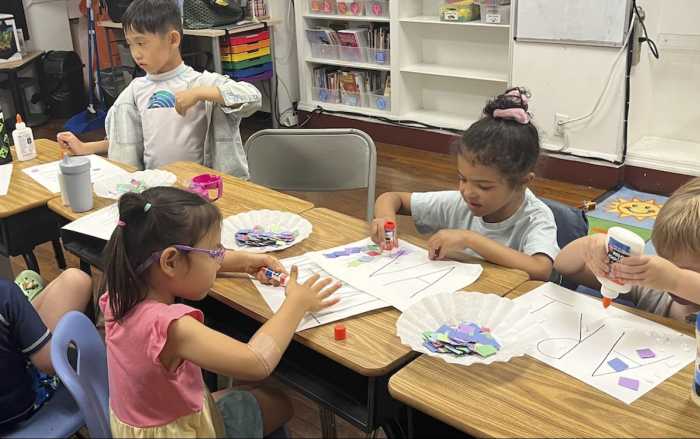There is an awakening happening in our homes in which parents like you are discovering the negative effects digital devices and obsessive, constant connectedness are having on their kids and their family.
In her roles as educator and motivational speaker focusing on parenting adolescents and social media, Laurie Wolk helps parents, and especially young girls, learn how to communicate and connect with themselves, each other, and the outside world.
“Physical and psychological changes in her adolescent brain mixed with the impact of the media — most importantly social media — [have] girls feeling lackluster about themselves and uncomfortable communicating in real life,” she explains.
The Westchester parent works hard to get the word out about raising balanced kids in our madcap, and sometimes dangerous, digital age, and provides mothers and fathers with practical advice and the tools they need to raise good online citizens in her timely, must-read new book “Girls Just Want to Have Likes: How to Raise Confident Girls in the Face of Social Media Madness” (Morgan James Publishing).
Here is part two of our interview with Wolk about teaching kids the do’s and don’ts of social media:
Tammy Scileppi: With teen mental illness, like depression, on the rise — due in part to lack of personal interaction — what should parents do?
Laurie Wolk: Our kids are facing a crisis of confidence. They’re not learning valuable social and emotional skills because of these devices. They’re more connected than ever and yet so alone. Many parents can barely get through to have a casual conversation or family dinner. Studies show they’re dating less, driving less, and hanging out with their friends in person less.
But with technology, like any new skill, we need to teach our kids the rules of the road while allowing for some twists and turns along the way. Our kids are going to need technology skills.
However, they also need to know how to monitor their own usage in a realm of 24-7 access, keep their self-esteem intact in a world of constant comparisons, and be good digital citizens.
TS: What can parents do to help their kids become more responsible and savvy in an increasingly vicious and sometimes predatory, online environment?
LW: I suggest that parents create a Digital Media Agreement. This one document can help you discuss, teach, and develop these skills. You’ll negotiate with your kids how frequently they can use their digital devices. You’ll create rules around being kind, responsible, and staying safe online. And you’ll help them unwind, decode, and begin to navigate the “hurts” one encounters by being connected 24-7.
Then you’ll listen and revisit the agreement with them every month or so. Your agreement will give you a platform to explain the “why” behind the rules and [it will give] your children the voice to explain what makes sense for their needs.
TS: Will things change for the better? What does the future look like?
LW: When it comes to social media, parents should stop trying to go back in time to the way things used to be. We’ve got to get on board. Trust me, if you’re aware and accepting of your kids’ online world, you’ll be much better positioned to help them navigate that part of their lives. And they’ll be much more willing to discuss it with you.
Start looking at smartphones, digital devices, social media, and our kids’ alternate universes as a good thing. Use a different lens. Learning more about social media and online interaction today will give us more insight into their worlds. And that’s something I know we all want! Honestly, I think like any innovation — the car, the phone, the cupcake, ha! — things will begin to find their “normal.” Eventually, we won’t feel so fearful that these digital devices are “ruining” our kids. I think we’ll all slowly learn how to avoid binging on technology so much.
TS: So, what’s the attraction behind their need to be connected 24-7?
LW: You see, digital devices and all their fancy buzzes, beeps, and notifications affect our brains the same way that a hug or achieving something does. At the slightest indication of a reward in the form of an alert, we get a dopamine hit. That hit brings us pleasure and makes us feel wanted and appreciated. However, those digital dopamine hits are never going to fulfill our “real” needs.
Only living “in real life” and getting an actual hug or achieving actual success can do that.
• • •
Good news! Taking control is easier than you think.
And Wolk has proof. For over a decade, she has spent a lot of her time in classrooms coaching parents and kids, and has witnessed firsthand the positive effects that simple back-to-basics lessons can have on her clients, their children, and even their family life.
She insists, “Social media and these pesky digital devices are not going to ruin your kids!
“My book and my online community — the Confident and Connected Kid Collective — can help that bold statement become a reality for parents,” continues Wolk. “Parents love it, because it’s a place where they can find like-minded parents to discuss the challenges of parenting in the digital age. They especially like the challenges I post each month that hold them accountable to ‘do’ the things they want, but often get too distracted to execute. It’s never too early or too late to start doing things differently.”
The holidays are a perfect time for every family member to finally disconnect for a while, then reconnect, and just enjoy some good old-fashioned fun together, like Family Fun Night or Game Night — Charades or Twister, anyone? — without distractions, arguing or nagging. Why not create a new holiday tradition?
Wolk’s book “Girls Just Want to Have Likes: How to Raise Confident Girls in the Face of Social Media Madness” (Morgan James Publishing) is available on Amazo
Tammy Scileppi is a Queens-based parent and regular contributor to New York Parenting.
Wolk this way
The following is an excerpt from chapter 10 of Laurie Wolk’s new book on the topic of what your daughters are not saying out loud.
• “Act approachable. Otherwise, I’ll keep my stories to myself.”
Kids, like horses, can feel your energy before you say anything. If you’re tense, nervous, focused on getting that e-mail out, they know — and will stay away.
• “Sometimes, just sometimes, it would be nice if you could point out when I’m doing something right instead of wrong.”
Every once in a while, catch your girl doing something good and let her know you appreciate her. Just because.
• “I do value family time. I just don’t want to value it all the time.”
What teenagers want most of all are social rewards, especially the respect of their peers.
Becoming an adult means leaving the world of your parents, and starting to make your way toward the future. A future that they will share with those peers. So, enjoy your time with your daughter. Make family time fun, and let her enjoy her friend time, too. Try and include her friends in some family activities to increase the strength of all of her ties.
• “Don’t correct me in front of people. I will pay closer attention if you do it in private.”
You are on your girl’s home team. In fact, you’re her best (and only dedicated) cheerleader, so why would you ever want to humiliate her in front of others? Plus, who can actually hear a “life lesson” if they are too busy feeling ashamed?
• “When I am feeling out of control, yell and push you away, do the opposite. Stay right where you are. Hold the line.”
You are family. You are her parents. She is supposed to give you her worst. And you are supposed to be her rock. Her anchor. Just stay close and steady for her. Show her that this, too, shall pass, and you’ll be right there when it does.
• “Don’t make me feel badly when I make a mistake. It puts too much pressure on me. I can’t be perfect.”
Our girls just want to be girls. Sometimes, they want to leave the food pantry messy to go back out to play, and admit they forgot their homework assignment at school without us making such a big deal out of it. Sure we’ve got big picture lessons to teach about responsibility, but sometimes, that can wait till later. Not every mistake signals a crisis or needs intervention.
• “Don’t think that you can’t apologize to me. Nothing makes me feel better than to know that you make mistakes, too. Show me how to handle that and put the relationship first.”
Showing your daughter that you are human and make mistakes, too, is one of the best things you can do to build her resiliency. And, showing your daughter what it looks like to be genuinely sorry and make amends is developing a crucial life skill.
• “Don’t let it upset you if I say mean things. It isn’t you I hate, but I resent when I feel you use your power to thwart me.”
Growing up isn’t easy. You remember that, right? Our girls are going to act out, say mean things, make mistakes and tell white lies. Accept it, and let your girl know that there’s nothing she can do that would change how you feel about her. (Okay, maybe not nothing, but you get the idea.) Tell her you love her, even though (you) don’t love her behavior. It’s a great go-to reminder when you want to pull your hair out, trust me.
• “Sometimes just zippy your lippy and let it slide.”
As our daughters get older, more and more, they simply want and need us to listen and be there for them. No judgments, no life lessons. Just be there.
— An excerpt from Laurie Wolk’s book “Girls Just Want to Have Likes: How to Raise Confident Girls in the Face of Social Media Madness” (Morgan James Publishing).













